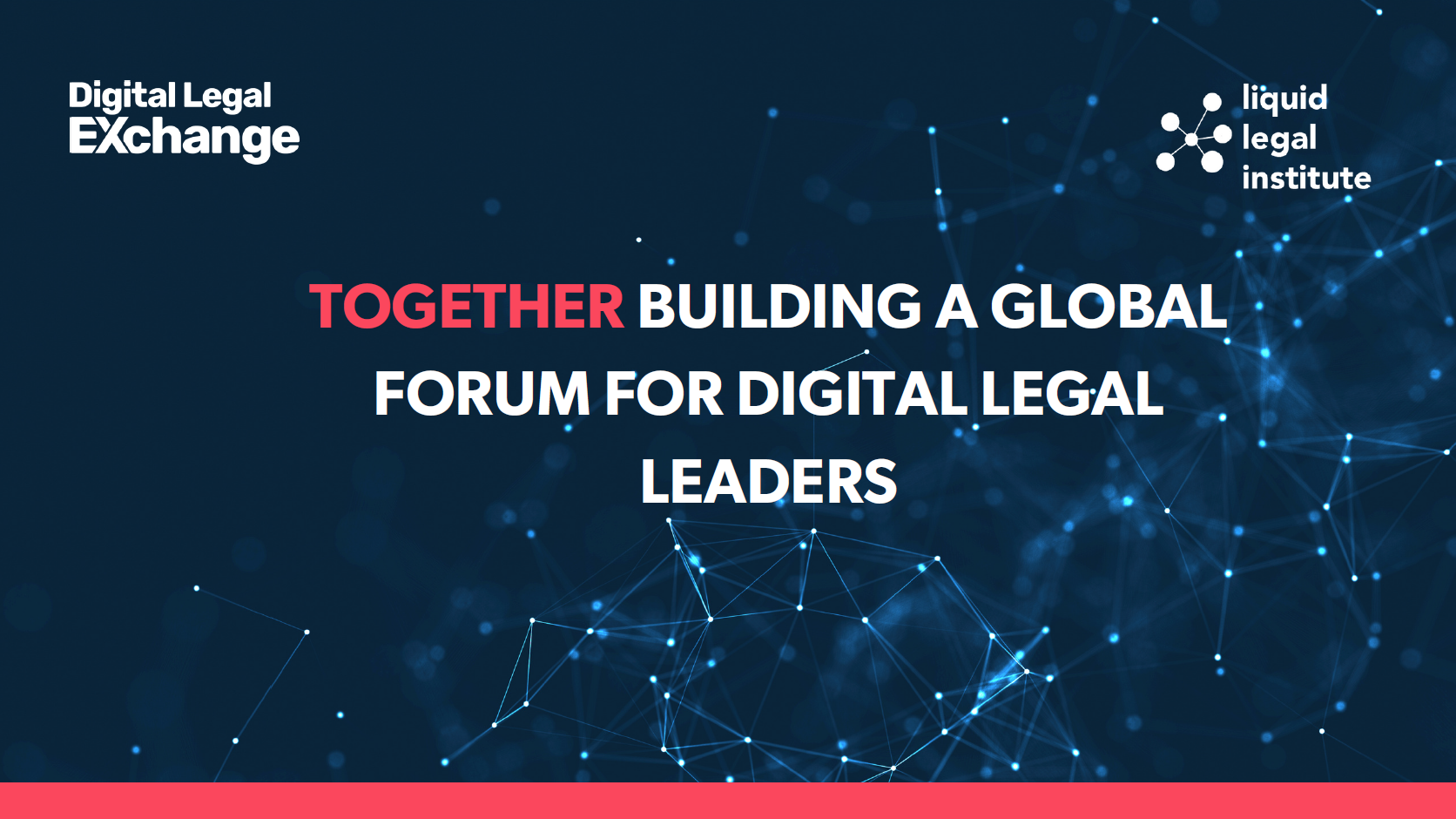Two
leading
international
legal
transformation
think
tanks,
Digital
Legal
Exchange
(DLEx)
and
Liquid
Legal
Institute
(LLI),
are
joining
forces
effective
April
1.
The
strategic
union
brings
together
more
than
1,500
members
representing
more
than
140
multinational
corporations,
organizations,
institutions
and
agencies
across
more
than
20
countries,
creating
what
the
organizations
describe
as
a
formidable
global
forum
for
legal
transformation.
Going
forward,
DLEx
will
operate
within
LLI
as
a
curated
legal
executive
forum
called
the
Digital
Leaders
Exchange
@
Liquid
Legal
Institute
(DLE@LLI),
to
be
led
by
the
cofounders
of
DLEx,
Chairman
William
“Bill”
Deckelman
and
Chairman
Emeritus
Mark
A.
Cohen.
The
union
aims
to
create
the
world’s
leading
think
tank
for
legal
transformation
under
the
motto,
“Together
we
design
the
future
of
legal.”
“Welcoming
the
distinct
DLEx
community
will
strengthen
LLI’s
vision
of
serving
as
an
international,
diverse
think
tank
focused
on
innovation
and
transformation
in
law,
embracing
all
parts
and
all
levels
of
the
organization,”
said
Dr.
Dierk
Schindler,
co-founder
and
co-CEO
of
LLI,
along
with
Kai
Jacob.
Deckelman,
who
is
currently
chief
legal
officer
at
Anderson
and
who
has
held
that
role
at
several
major
corporations,
added:
“The
opportunity
to
formalize
the
close
working
relationship
DLEx
has
had
with
LLI
is
very
exciting
and
will
create
a
powerful
capability
to
collaboratively
address
the
significant
challenges
facing
corporate
legal
organizations
in
the
AI
era.”
Complementary
Organizations
The
merger
reflects
the
two
organization’s
complementary
strengths
and
approaches.
Both
have
collaborated
in
the
past
and
even
share
some
overlapping
members.
Both
focus
on
applied
research,
community
building,
and
practice
solutions.
And
both
are
navigating
the
same
terrain
of
enhancing
the
legal
function.
In
an
interview
for
my
LawNext
podcast
that
will
air
tomorrow
with
Schindler
and
Cohen,
Schindler
explained
that,
while
LLI
started
as
an
association
for
the
“doers
and
shakers”
in
legal
organizations,
eventually
bringing
in
more
managing
partners,
general
counsel,
and
senior
business
leaders,
DLEx
began
from
the
outset
with
a
focus
general
counsels
and
senior
leaders.
With
this
union,
and
the
creation
of
DLE@LLI,
there
is
still
a
space
for
general
counsel
to
continue
to
have
an
exchange
in
the
spirit
fostered
by
DLEx,
while
also
opening
the
door
for
them
to
bring
in
more
of
their
teams
to
engage
in
projects,
initiatives,
roundtables,
and
the
like.
In
addition,
Schindler
said,
the
union
broadens
the
organization’s
geographic
scope.
Because
LLI
was
founded
in
Germany,
its
membership
is
strongest
in
Europe.
By
contrast,
the
bulk
of
the
membership
of
DLEx
is
in
the
United
States
and
the
United
Kingdom.
“It’s
a
win-win-win
all
around,”
Schindler
said.
“The
initial
feedback
that
we’ve
received,
both
from
the
Liquid
Legal
Institute
community,
but
also,
more
importantly,
from
the
DLEx
community,
is
super
positive
in
terms
of
seeing
that
added
value
and
additional
opportunity.”
One
Plus
One
Equals
11
Cohen,
an
internationally
known
legal
business
consultant
at
Legal
Mosaic
and
longtime
columnist
for
Forbes,
described
the
union
as
one
in
which
“one
and
one
adds
up
to
11,”
noting
that
both
organizations
share
common
goals
and
methods.
“For
a
long
time,
Bob,
my
view
is
that
our
industry
has
been
too
vulcanized,”
Cohen
said
in
our
podcast
interview.
Too
many
legal
associations,
he
said,
are
too
heavily
driven
by
concerns
about
dues
and
sponsorships.
In
contrast,
neither
LLI
nor
DLEx
are
sponsor
driven,
but
rather
are
independent
and
have
as
their
primary
goal
creating
community.
Founded
in
2018,
DLEx
has
functioned
as
a
global,
non-profit
membership
forum
for
general
counsels,
business
leaders,
and
select
external
advisors
focused
on
accelerating
digital
transformation
of
the
corporate
legal
function.
LLI,
also
founded
in
2018,
is
an
international
think
tank
devoted
to
legal
transformation
with
a
broader
membership
representing
the
entire
legal
sector.
The
integration
creates
expanded
opportunities
for
member
organizations.
Former
DLEx
members,
who
typically
engaged
as
individuals
or
with
a
deputy,
can
now
bring
entire
teams
(up
to
30
members)
into
LLI
activities.
Current
DLEx
members
will
automatically
become
LLI
members
through
2025.
Benefits
to
members
will
include
expanded
community,
scholarship,
and
live
and
virtual
events,
drawing
on
the
expertise
of
each
group’s
members.
DLEx
entity
members
can
now
engage
more
of
their
colleagues
in
a
wide
range
of
LLI
transformation
activities
appropriate
to
their
level
and
role.
DLE@LLI
will
continue
to
host
DLEx’s
signature
Salons
—
invitation-only
virtual
events
for
GCs
and
senior
innovation
leaders
to
engage
in
candid
and
robust
exchanges
on
timely
topics.
A
dedicated
DLE
Executive
Office,
led
by
Robert
Dilworth,
who
was
already
a
member
of
both
organizations,
will
ensure
a
smooth
transition
and
support
DLE
activities
within
the
broader
LLI
framework.
Joint
Events
Planned
A
series
of
initial
joint
projects
and
events
is
already
planned,
which
includes:
-
The
April
12
publication
of
the
book,
Liquid
Legal
—
Sustaining
the
Rule
of
Law,
which
includes
contributions
from
some
30
members
of
both
LLI
and
DLEx.
-
Featured
content
at
Legal
Tech
Talk
2025
in
London
(June
26-27)
and
LLI’s
2025
Summit
in
Düsseldorf
(July
7-8),
including
a
private
GC
meeting
and
dinner
associated
with
these
events.
-
Publication
of
a
collaborative
white
paper
on
gen
AI-era
legal
sector
talent.
The
organizations
share
a
vision
of
transforming
the
legal
function
to
better
serve
business
needs
in
a
digital
world.
“Transformation
has
a
lot
to
do
with
mindset,
first
and
foremost,”
Schindler
explained
in
our
podcast
interview.
“This
is
not
a
project.
This
is
not
about
technology,
first
and
foremost.
This
is
about
people,
yes,
but
first
of
all,
it’s
a
mindset.”
Cohen
emphasized
the
importance
of
creativity
and
curiosity
in
modern
legal
practice:
“When
I
was
a
baby
lawyer
…
you
were
not
encouraged
to
be
creative.
You
were
not
particularly
encouraged
to
be
curious.
And
I’m
delighted
to
say
that
in
today’s
world,
I
think
that
has
become
a
real
requisite
for
lawyers.”




















